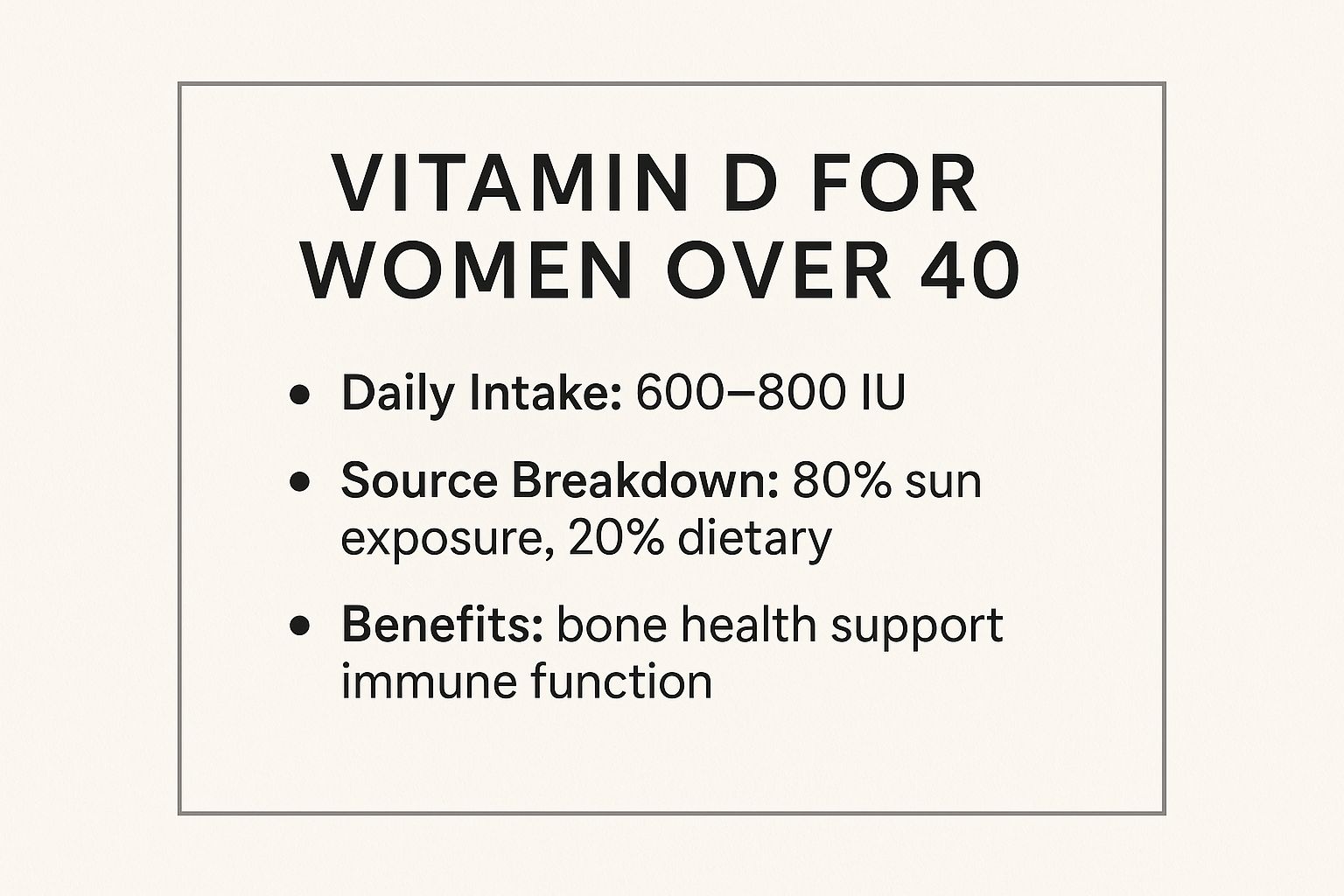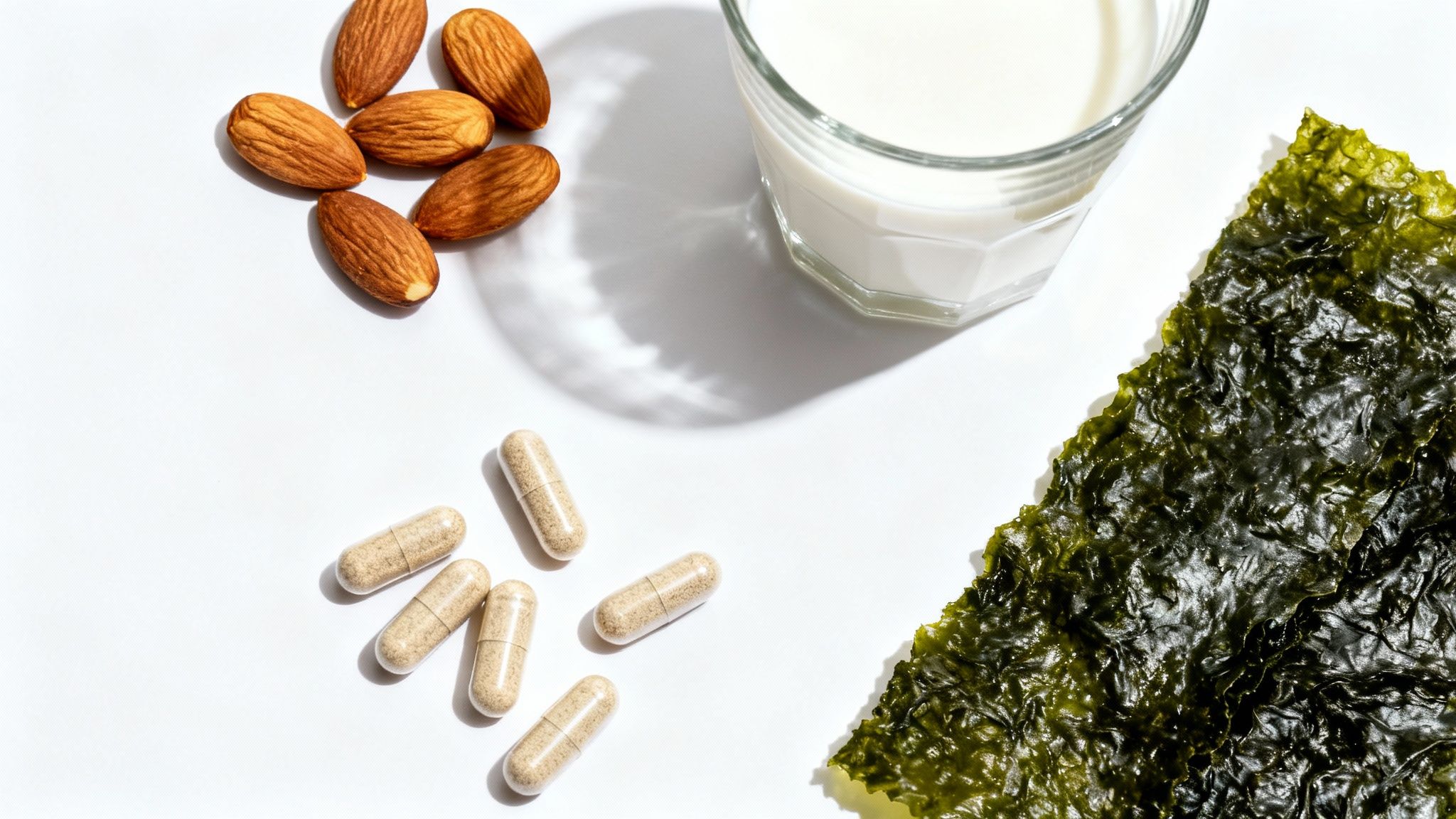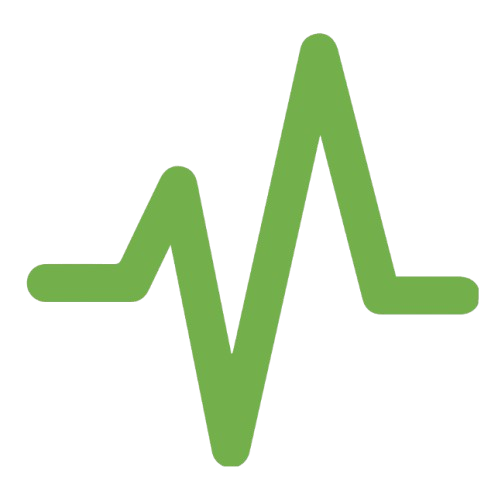
A Practical Guide to Vitamins for Women Over 40
Share
Turning 40 is a milestone. While you might feel as vibrant as ever, your body is starting a powerful new chapter behind the scenes. The key is understanding these shifts so you can meet them head-on, feeling your absolute best.
Your Health Journey After 40 and What to Expect

If you're in your forties, you’ve probably noticed your body has its own new rhythm. These aren’t random quirks; they're signs your body is moving into a different phase of life—one that requires a fresh, practical approach to your health.
This new chapter often brings the hormonal fluctuations of perimenopause, which can affect everything from your mood to your sleep quality. You might also find your metabolism isn't quite the powerhouse it once was, making it easier to gain weight and harder to keep your energy up.
Why Your Body's Needs Are Shifting
These changes are part of a finely tuned biological process that calls for a smarter way of thinking about nutrition and wellness. The diet that worked in your twenties and thirties might not give your body the support it needs today.
To feel truly great, it helps to understand what’s going on internally. Here are some of the key adjustments women over 40 often experience:
- Bone Density Reduction: As oestrogen levels naturally decline, so can bone density. This makes protecting your bones more important than ever to reduce the risk of osteoporosis later on.
- Metabolic Slowdown: A natural decrease in muscle mass, combined with hormonal shifts, can gently slow your metabolic rate. This changes how your body burns energy.
- Hormonal Imbalance: Fluctuating hormones can bring on symptoms like hot flushes, mood swings, and fatigue, making some days feel more challenging.
Think of this as your personal roadmap for this new phase. By homing in on the right vitamins for women over 40, you can navigate these changes with confidence and feel strong, vibrant, and in control of your health.
Taking a holistic wellness approach is the cornerstone of thriving after 40, ensuring you find balance across your mind, body, and spirit. This guide will walk you through the key vitamins and minerals that become non-negotiable, helping you build a solid foundation for lasting vitality.
Why Your Nutritional Needs Change When You Hit Your Forties

Think of your body like a well-loved car. As it logs more miles, its needs for fuel and maintenance change to keep everything running beautifully. As we step into our forties, our bodies start asking for a different nutritional game plan to stay at their best.
This isn’t about a drastic, overnight overhaul. It’s about making smart, practical tweaks. The biological shifts that kick off in this decade mean our bodies use and absorb nutrients differently. Getting to grips with these changes is the first real step toward a diet and supplement routine that works with your body, keeping you feeling strong and full of life.
The Impact of Hormonal Fluctuations
One of the biggest shifts for women over 40 is the gradual dip in oestrogen as perimenopause begins. This single hormonal change creates a domino effect. Oestrogen is vital for keeping our bones dense and strong, so as those levels fall, the risk of osteoporosis creeps up.
It also helps regulate our mood and keep our minds sharp. If you’ve been noticing more brain fog or feeling like you’re on an emotional rollercoaster, fluctuating hormones are often the culprit. This is precisely why certain nutrients become non-negotiable for supporting hormonal balance and bone health.
Your forties are a period of transition, not decline. By understanding these internal shifts, you can proactively give your body the specific building blocks it needs to thrive, turning this new chapter into one of strength and vitality.
Metabolic Shifts and Energy Production
Another key thing that evolves is our metabolism. It’s incredibly common to notice a bit of a slowdown, which is often tied to a natural decline in muscle mass. Since muscle is a calorie-burning powerhouse compared to fat, this change can affect your weight and energy levels.
On top of that, your body’s ability to absorb certain key nutrients, like Vitamin B12, can become less efficient. This makes it harder to get the full benefit from your food alone. Supporting your metabolic health with the right vitamins for women over 40 is essential for keeping your energy steady and kicking fatigue to the curb. For a more detailed look, you can explore our guide on essential women’s health vitamins.
The Growing Need for Antioxidant Support
Life in your forties often brings more responsibility and, let’s be honest, more stress. This can speed up cellular ageing through a process called oxidative stress—an imbalance between damaging free radicals and the antioxidants that fight them.
To push back, your need for antioxidants—found in colourful fruits, veggies, and specific supplements—becomes more important than ever. These powerful compounds act like bodyguards for your cells, protecting them from damage and supporting everything from skin health to cognitive performance. Making them a priority helps your body build resilience from the inside out.
The Sunshine Vitamin Your Bones are Asking For
Often called the “sunshine vitamin,” Vitamin D is an essential nutrient for women over 40. But let's be honest, it's notoriously difficult to get enough of it, especially for those of us living in the UK with our less-than-sunny skies.
Its main job is to act like a gatekeeper, allowing your body to absorb the calcium you get from your diet. Without enough Vitamin D, you could be eating plenty of calcium-rich foods, but your bones simply won't get the benefit.
Think of it this way: calcium is the brick, but Vitamin D is the builder that lays the foundation for a strong skeleton. As oestrogen levels decline with age, bone density naturally decreases, making this partnership more critical than ever to help fend off conditions like osteoporosis.
But its role doesn't stop there. Vitamin D is also a key player in supporting a robust immune system and regulating mood—both common concerns for women navigating their forties and beyond.
Why Getting Enough is a Challenge
Maintaining adequate Vitamin D levels is a real challenge for women over 40 in the UK. Deficiency is widespread; in fact, the National Diet and Nutrition Survey revealed that average intakes from food alone were below the recommended amount for all age groups.
This highlights a clear need for supplementation. What's more, only a small fraction of UK adults report using supplements, which is a worry considering how vital Vitamin D is for women at a higher risk of osteoporosis. For a deeper dive, naturemade.com has some great insights on UK nutrient intake.
To put it all into perspective, here's a quick summary of the key facts.

This data shows how much we rely on sun exposure—something often in short supply here in the UK. This makes getting it from our diet and through supplements absolutely necessary for bone and immune support.
Bridging the Nutritional Gap
Given how tricky it is to get enough sun and the limited number of food sources, taking a supplement is often the most reliable way to meet your daily needs.
When you're choosing one, look for Vitamin D3. It's much more effective at raising and maintaining your body’s Vitamin D levels compared to its D2 counterpart. For a reliable option that gets the job done, consider our high-quality Vitamin D3 2,000 IU supplement.
A daily intake of 600–800 IU (International Units) is generally recommended, but your individual needs might be higher. The best way to know for sure is to ask your healthcare professional for a blood test. They can help you figure out your personal requirements and make sure you're on the right track.
Essential Nutrients for Energy and Hormonal Balance

As your body navigates the shifts that come with your forties, keeping your energy levels steady and hormones in check often moves to the top of the list. Think of certain nutrients as your personal support team, working behind the scenes to help you feel vibrant and balanced.
This decade can sometimes bring a wave of fatigue and mental fog, but the right combination of vitamins and minerals can make a world of difference. By dialling in on these key players, you can give your body’s intricate systems a real boost, from energy production to stress management.
B Vitamins: The Energy Igniters
The B-vitamin family, especially B12 and Folate (B9), are like the spark plugs for your cellular engines. They play a fundamental role in converting the food you eat into usable fuel, helping to fight back against the persistent tiredness that can creep in after 40.
Vitamin B12 is vital for healthy nerve function and making red blood cells, which carry oxygen throughout your body. The catch is, as we get older, our ability to absorb B12 from food can dip, making supplementation a smart move for many women.
Folate is another crucial one, particularly for any woman even considering a pregnancy. National survey data found that a worrying 6% of women aged 19-64 weren't getting enough folate. What’s more, only about 40% of women aged 35 to 39 took folic acid supplements before getting pregnant, highlighting a major gap in nutritional support needed to prevent birth defects.
Magnesium: The Ultimate Calming Mineral
If stress, restless nights, and muscle tension are part of your regular vocabulary, magnesium might just become your new best friend. This powerhouse mineral is involved in over 300 biochemical reactions in the body, yet it's one of the most common deficiencies.
Magnesium helps regulate the body's stress-response system. It encourages relaxation by maintaining healthy levels of GABA, a neurotransmitter that tells your nervous system to calm down. This makes it a fantastic tool for improving sleep quality and taking the edge off anxiety.
Think of magnesium as a master regulator. It helps your muscles unwind after a workout, quiets a racing mind before bed, and even supports stable blood sugar levels. It’s a true multi-tasker for women’s health.
For those who want to dig deeper, exploring the hidden connection between your nervous system and hormonal balance can offer fantastic insights into how these systems are intertwined. You can also get more tips for creating a supportive routine in our guide to supplements for hormone imbalance.
Thyroid Support: Iron and Iodine
Your thyroid gland is the master controller of your metabolism, and its health is directly linked to your energy levels. Two key minerals, iron and iodine, are absolutely essential for it to function properly.
Iron is at the heart of haemoglobin, the protein in your red blood cells that transports oxygen. When iron levels are low, it can lead to anaemia, with symptoms like extreme fatigue, weakness, and shortness of breath – feelings that are all too familiar for many women over 40.
Iodine, on the other hand, is a direct building block for your thyroid hormones. Without enough of it, your thyroid can’t produce the hormones needed to keep your metabolism ticking over, which can lead to sluggishness and weight gain.
Key Nutrients for Women Over 40 at a Glance
To help you put it all together, this table summarises the most important vitamins and minerals we've discussed, their key benefits for women over 40, and some of the best food sources to add to your shopping list.
| Nutrient | Primary Benefits for Women Over 40 | Rich Food Sources |
|---|---|---|
| B Vitamins | Supports energy production, brain function, and mood regulation. | Leafy greens, eggs, legumes, salmon. |
| Magnesium | Aids sleep quality, reduces stress, and eases muscle tension. | Almonds, spinach, dark chocolate, avocado. |
| Iron | Combats fatigue by supporting oxygen transport and thyroid function. | Red meat, lentils, spinach, fortified cereals. |
| Iodine | Crucial for thyroid hormone production and metabolic health. | Seaweed, cod, dairy products, iodised salt. |
Focusing on a diet rich in these foods is the best first step. When life gets in the way, a high-quality supplement can be an excellent way to fill in any nutritional gaps and keep you feeling your best.
How to Choose High-Quality Supplements
Walking into the supplement aisle or browsing online can feel completely overwhelming. With endless bottles all making big promises, it’s hard to know where to even start. But here’s the secret: choosing high-quality vitamins for women over 40 is less about fancy marketing and more about understanding what's actually inside the bottle.
A truly effective supplement starts with its ingredients. The goal is to find a product that gives your body what it needs in a form it can actually use, without any unnecessary extras. It’s all about making smart, informed choices that will genuinely support your health.
Reading Labels Like an Expert
The first step is to turn the bottle around and look past the flashy front label. The ingredient list is where the real story is. Keep an eye out for unnecessary fillers, binders, and artificial colours. These don't offer any health benefits and can sometimes interfere with how well your body absorbs the good stuff.
Next, pay close attention to the form of the nutrient. This is where bioavailability comes in—a term that simply means how well your body can absorb and use a nutrient.
Think of it like this: your body has a specific keyhole for each nutrient. A high-bioavailability supplement provides the perfectly shaped key, while a low-quality one offers a key that barely fits, meaning very little of the nutrient actually gets through the door.
For example, magnesium glycinate is generally much better absorbed and gentler on the stomach than the cheaper, more common magnesium oxide. It's a small detail on the label that makes a massive difference to the results you'll feel.
Why Third-Party Testing Matters
How can you be sure that what’s on the label is actually what’s in the supplement? This is where third-party testing becomes your best friend. Independent organisations test products for purity, potency, and safety, verifying that they are free from contaminants and contain the amount of active ingredients claimed.
Looking for certifications from respected bodies like NSF International or USP provides an extra layer of confidence that you’re investing in a product that is both safe and effective. It's a simple check that separates reputable brands from the rest.
Building Your Foundational Support System
While targeted nutrients are important, getting the foundation right is key. For many women over 40, this starts with a few core supplements:
- A High-Quality Multivitamin: Think of this as your daily nutritional insurance policy, filling in any small gaps in your diet.
- Omega-3 Fatty Acids: Essential for supporting heart health, reducing inflammation, and keeping your brain sharp.
- Adaptogens like Ashwagandha: This can be a game-changer for managing the stress that often comes hand-in-hand with this busy decade of life.
- Creatine: Far from just a muscle-builder, creatine supports cognitive function, energy levels, and can help preserve muscle mass as we age.
Dietary trends in the UK also reveal common shortfalls. For instance, iron and iodine deficiencies are surprisingly widespread, with nearly 25% of women aged 19 to 64 having low iron intakes. As our diets and lifestyles shift, it's vital to stay mindful of your needs and use supplements to ensure you're getting everything your body requires to thrive. You can learn more about the specific health challenges and micronutrient needs for UK women.
Building a Sustainable Health Routine
Knowing which vitamins are right for you after 40 is a great first step, but remembering to take them consistently is the real challenge. The best supplements in the world won’t do a thing if they’re just gathering dust in your cupboard.
The trick is to make it an automatic part of your day. Try habit stacking, where you link your new supplement habit to something you already do on autopilot.
For instance, keep your vitamins right next to the coffee machine to take with your morning cup. Or, pop them by your toothbrush to make them part of your wind-down routine at night. It’s a simple but surprisingly effective way to build consistency.
Food First, Always
Remember that supplements are there to do just that—supplement. They are not a replacement for a healthy, balanced diet. A "food first" philosophy is your best bet for long-term health, giving you a huge spectrum of nutrients, fibre, and other goodness that you just can't get from a pill.
Think of it like this: your diet is the foundation of your house. Supplements are the targeted reinforcements, like adding support beams for bone health or upgrading the wiring for better energy. You need that solid foundation for everything else to work properly.
Before you start any new supplement routine or make big changes to your health plan, please have a chat with a qualified health professional. They can give you advice that’s tailored specifically to you, making sure your choices are both safe and effective.
Getting that expert sign-off is the final, non-negotiable step to creating a health routine that truly lasts.
Common Questions Answered
Stepping into the world of supplements can feel overwhelming. There's a lot of information out there, and it's easy to get confused. Let's clear up some of the most common questions about vitamins for women over 40 so you can feel confident about your choices.
Should I Take a Multivitamin or Individual Supplements?
Think of a high-quality multivitamin as your daily nutritional insurance policy. It's a fantastic foundation for covering general bases and acts as a safety net, making sure you get a broad range of essential nutrients without juggling a dozen different bottles.
However, if you're targeting a specific health goal or know you're running low on something—like Vitamin D or Magnesium—then individual supplements are usually the smarter move. They allow you to take a more focused, higher dose to directly address what your body needs. The best strategy? It often begins with a chat with your doctor and some blood work to see exactly where you stand.
How Do I Know If I Have a Vitamin Deficiency?
Your body is pretty good at sending out signals when something's not quite right. Persistent fatigue that coffee can't fix, moodiness, more hair in your brush than usual, or brittle nails can all be clues pointing towards a deficiency.
But while these signs are useful, they're not definitive. The only way to know for certain is through a simple blood test from your doctor. It swaps guesswork for real data, giving you a clear picture of what's going on and helping you build a supplement plan that will actually work.
A nutrient-dense diet is always the best starting point. But after 40, it can be challenging to get optimal amounts of certain nutrients from food alone, especially as the body's absorption efficiency can change with age.
Can I Get All My Vitamins from Diet Alone After 40?
In a perfect world, maybe. But in reality, it's incredibly tough. A balanced, whole-food diet is non-negotiable, but as we get older, physiological changes can make it harder for our bodies to pull all the nutrients it needs from our food.
Nutrients like Vitamin D, Vitamin B12, and Magnesium are classic examples where food often isn't enough for women over 40. Supplementing helps bridge that gap, ensuring you're consistently meeting your body's new demands and supporting your health for the long haul.
Ready to find the right supplements tailored to your unique needs? Take the VitzAi.com health quiz today to get your personalised recommendations. Visit us at https://vitzai.com to get started.
This article is for informational purposes only and is not medical advice. Always consult a qualified health professional before starting any new supplement or major lifestyle change.
